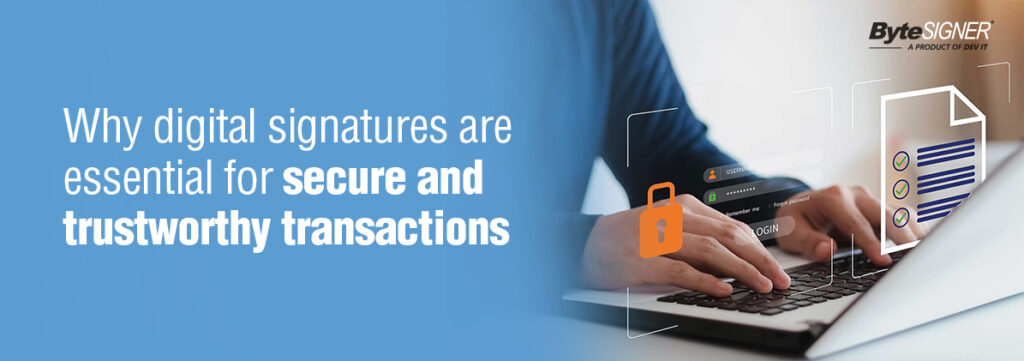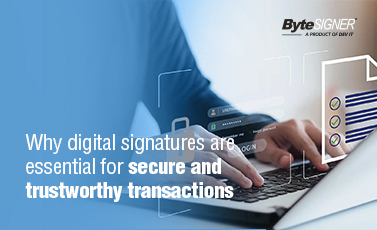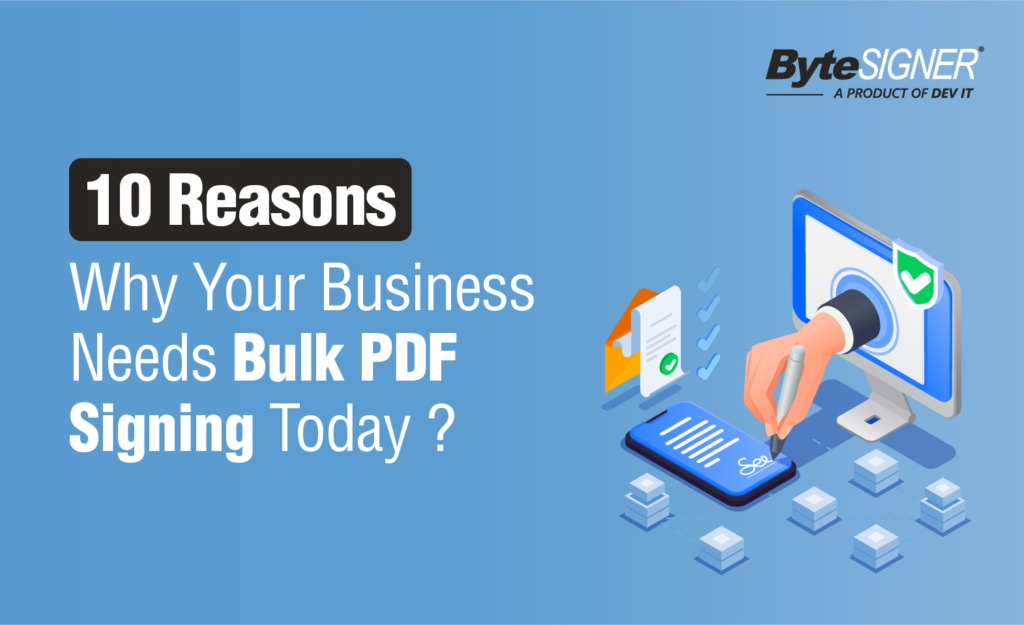
In today’s fast-paced digital world, security and trust are crucial for transactions. Digital signatures provide a legally recognized way to sign documents online, ensuring authenticity and protection against fraud. They not only enhance security but also streamline processes, making transactions more efficient. This blog explores why digital signatures are essential for secure and reliable transactions.
Understanding Digital Signatures
A digital signature is a secure way to verify the authenticity of a document or message. It is built on Public Key Infrastructure (PKI), ensuring that a document remains unchanged and originates from a verified source. Unlike a simple electronic signature, digital signatures use encryption and authentication for enhanced security.
How Digital Signatures Work
Digital signatures use asymmetric encryption, consisting of a private key for signing and a public key for verification. When a document is signed, a unique digital fingerprint is encrypted with the signer’s private key. The recipient uses the public key to decrypt and verify the signature’s authenticity. If the document is altered, the signature becomes invalid, preserving integrity.
Types of Digital Signatures
- Simple Digital Signatures – Basic electronic signatures that may not always require identity verification.
- Advanced Digital Signatures – Provide more security with identity verification and encryption.
- Qualified Digital Signatures – The highest level of security, legally equivalent to handwritten signatures.
Why Digital Signatures Are Important in Transactions
As cyber threats increase, digital signatures offer security, authentication, and efficiency, making them indispensable for modern businesses and individuals.
Security
Digital signatures use encryption to prevent unauthorized modifications, ensuring document integrity and reliability.
Authentication
They verify the identity of the signer, reducing the risk of fraud and unauthorized access.
Non-Repudiation
Digital signatures are uniquely linked to the signer, preventing denial of signing and increasing accountability.
Efficiency
By eliminating the need for paper-based approvals, digital signatures save time and reduce costs.
Environmental Impact
By reducing paper consumption, digital signatures contribute to sustainability efforts and minimize waste.
Key Benefits of Digital Signatures
Enhanced Security
With encryption and authentication, digital signatures provide a secure method to sign documents.
Legal Compliance
Digital signatures comply with international regulations, such as the eIDAS regulation (EU), ESIGN Act (USA), and IT Act (India), ensuring legal validity.
Cost and Time Savings
A paperless approach reduces administrative expenses while speeding up approvals and transactions.
Global Accessibility
Digital signatures allow users to sign and verify documents from anywhere, enabling faster and more convenient transactions.
Improved Workflow Efficiency
With automated signing and approval processes, businesses can optimize their document management systems.
Common Use Cases of Digital Signatures
Business Contracts and Agreements
Companies use digital signatures to sign contracts securely, reducing paperwork and ensuring authenticity.
Banking and Financial Transactions
Banks and financial institutions rely on digital signatures for secure transaction approvals and identity verification.
Healthcare Sector
Hospitals use digital signatures for medical records, prescriptions, and patient consent forms, ensuring security and compliance with regulations like HIPAA.
Government and Tax Filings
Government agencies use digital signatures for tax returns, permits, and official documents, improving efficiency and security.
Legal and Compliance Documents
Lawyers and firms use digital signatures to authenticate contracts, affidavits, and compliance reports.
E-commerce Transactions
Online businesses and marketplaces use digital signatures for vendor agreements, customer transactions, and compliance with security standards.
Addressing Challenges in Digital Signature Adoption
Despite the benefits, some businesses hesitate to adopt digital signatures due to certain concerns. Addressing these barriers can help accelerate adoption.
Lack of Awareness
Many organizations are unaware of the efficiency and security benefits of digital signatures. Educating decision-makers on their advantages and legal recognition can encourage adoption.
Regulatory Compliance Complexity
Different countries have distinct digital signature laws. Businesses need to ensure compliance with their local regulatory frameworks to avoid legal risks.
Security Concerns
Some companies worry about unauthorized access or key theft. Implementing strong security measures, such as multi-factor authentication and secure key storage, can address these concerns.
Integration with Existing Systems
Businesses may find it challenging to integrate digital signatures into their existing processes. Choosing a user-friendly solution that integrates with document management systems can simplify this transition.
Resistance to Change
Traditional businesses may resist shifting from manual paper-based processes to digital solutions. Demonstrating the ease of use and efficiency gains can help ease the transition.
Future of Digital Signatures
As digital transformation accelerates, the adoption of digital signatures will continue to grow. Innovations in blockchain technology, artificial intelligence, and biometrics are set to make digital signing even more secure and efficient. Businesses and individuals who embrace these advancements will benefit from improved security, cost savings, and compliance with evolving regulations.How ByteSigner Enhances Secure and Trustworthy Transactions
ByteSigner ensures document security through advanced encryption and complies with global regulations like eIDAS and ESIGN, making signed documents legally binding. It streamlines workflows by automating bulk signing, reducing manual processes, and increasing efficiency. With multi-factor authentication, ByteSigner verifies signer identities, preventing fraud and maintaining data integrity. Seamlessly integrating with existing systems, it simplifies digital adoption while reducing costs and promoting environmental sustainability.
Conclusion
Digital signatures are a game-changer for secure, efficient, and legally valid transactions. By enhancing security, improving workflow, and reducing costs, they provide businesses and individuals with a trusted way to sign pdf documents digitally. As the digital landscape continues to evolve, adopting digital signatures will be crucial for safeguarding transactions and building trust in the online world. If your organization hasn’t yet implemented a digital signature solution, now is the perfect time to transition to a secure, paperless, and efficient way of handling transactions.
Get Started with Bytesigner Today!
We offer a secure and user-friendly digital signature solution to help businesses streamline their document approvals. Our platform ensures legally compliant, encrypted, and hassle-free transactions. Start your secure digital signing journey today with Bytesigner. Contact us now to learn more!



